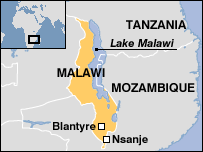Media in the lower Shire to focus in disaster risk reduction and climate change (DRR/CC)
Published on August 24, 2011 at 8:30 AM by FACE OF MALAWI
By Joshua David Morishu (FaceofMalawi reporter)
 The media practitioners based in the two districts of Nsanje and chikhwawa in the lower shire of Malawi will now start concentrating on reporting on issues pertaining to disaster risk reduction (drr) and climate adaptability.
The media practitioners based in the two districts of Nsanje and chikhwawa in the lower shire of Malawi will now start concentrating on reporting on issues pertaining to disaster risk reduction (drr) and climate adaptability.
This was revealed at a two day lower shire media workshop which was organized by the Evangelical association of Malawi an NGO based in chikhwawa district, James Kalikwembe is the progamme manager for disaster risk reduction and climate change adaptability for the E.A.M in the district. Kalikwembe further said the purpose of the meeting was to promote partnership with media personnel so that they try to sensitize or give early warning systems about the yet to come disasters as one way of keeping all the people informed. Kalikwembe said the meeting was aimed at facilitating linkages between the media and the N.G.O. He said among other things the two districts of Nsanje and chikhwawa are prone to natural hazards such as floods, drought and the issue of climate change. Kalikhwemb e added that due to geographical position-low lying areas, the two receive very little rainfall hence experience a number of vulnerability factors such as dry spell floods etc.
He quickly said in many times, Journalists in the country their focus is on the time when the disasters have happened and very little is said and reported after. The programme manager however revealed that the community due to illiteracy levels has no information about the disasters that affect them hence there’s a need for the media to bring in and promote work of disaster risk reduction and environmental rehabilitation.
Apparently he said this can only happen I f the media understand the knowledge of these issues. Generally and according to him, the E.A.M’s objectives are to engage media in a dialogue about the role they can play during and after disaster and climate change related to humanitarian crisis and promote proactive approach to DRR/ climate change related crisis reporting. The other point he said in various media institutions when It comes to selection of stories political stories are much respectful than the ones attached to drr activities. He however, said in other countries programmes in line with drr and climate change activities are all being broadcasted in various radio stations to alert the people about the situation but expressed with concern that this does not take place in Malawi. On this part he urged journalists to form a network which will ensure that the community is timely informed about the problems to come. At least 16 journalists took part in the workshop and were from different print and broadcasting media houses such as star fm radio , transworld radio, national newspaper, daily times newspaper,zodiak broadcasting station,calvaly family church T.V,Malawi news agency, radio Maria and fm 101 radio station. Additionally at the end of the meeting, journalists agreed to form network which will focus on disaster issues that affect the two districts of Nsanje and chikhwawa. The evangelical Association of Malawi is running the project with the aid from European Union to the tune of k15 million for 11 months. In actual fact, one of the facilitators at the meeting, Charles Chikapa, a retired journalist who once worked for the Malawi broadcasting corporation, (MBC) told journalists that to tell the story of climate change well, they need to understand the science of politics, the economics and many more. Secondly chikapa said they need to understand these kinds of impacts that a warmer could bring between adaptation and mitigation.
Chikapa added that there are a lot of challenges that the media is facing in the country .He gave an example of the Phalombe disaster which was one of the worse disasters which happened some time back where by a lot of houses were completely destroyed. furthermore he said the road to the district was impassable hence journalists were willing to go and visit the scene but due to lack of transportation, they failed and while on the other hand, when the authorities organized a trip to visit the affected area by a helicopter, reporters were not picked up for the journey and this has seen them reporting their stories in absentee.


